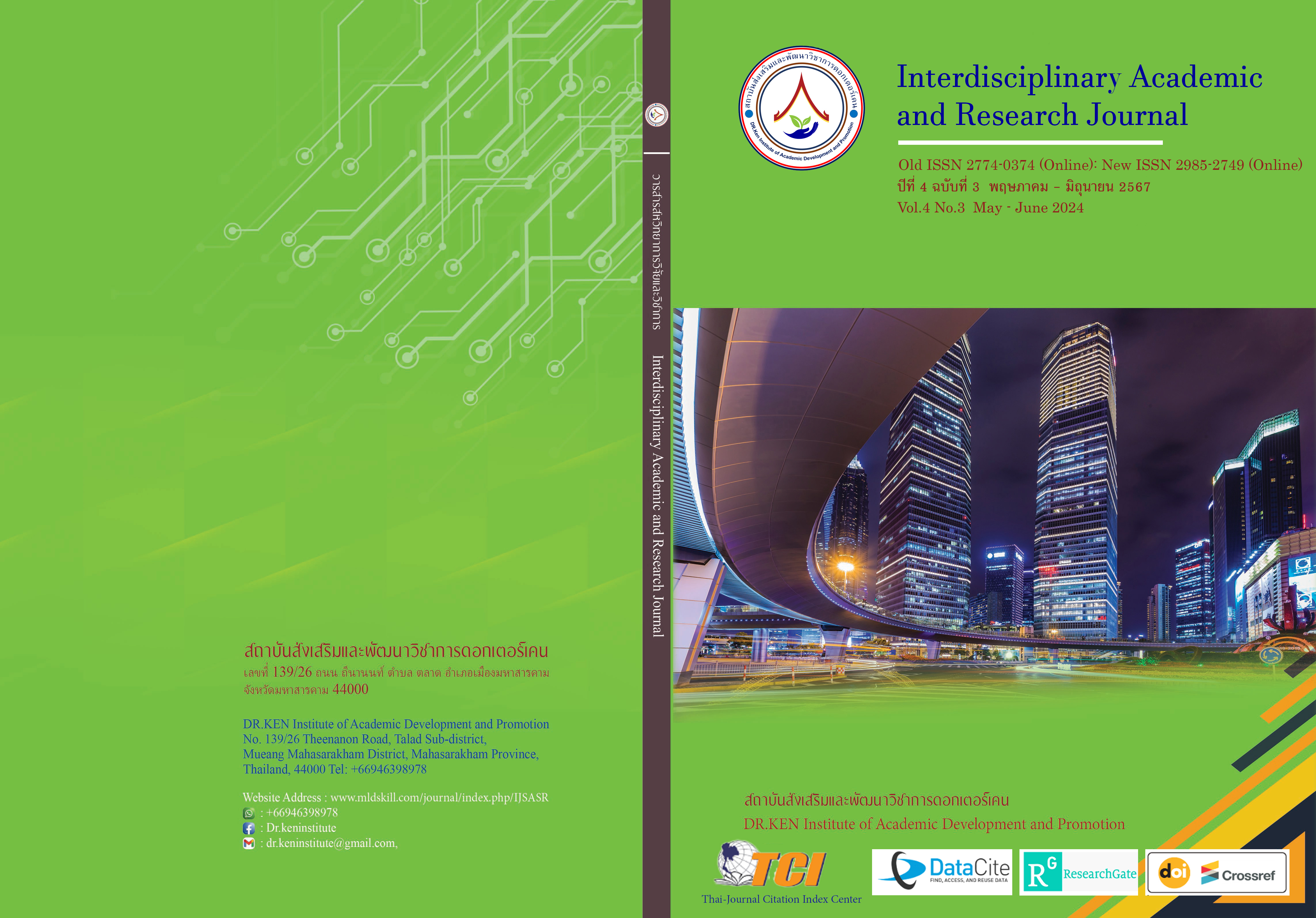Promoting Social Behavior in Early Childhood Through Sports Games
DOI:
https://doi.org/10.60027/iarj.2024.275700Keywords:
Sports Games; , Social Behavior;, Early ChildhoodAbstract
Background and Aims: The desire of kids to play with friends and integrate into society Desire to be free to explore and learn about the world around them. wish to receive praise and encouragement from adults It is an answer to the social demands of young children. Thus, the purpose of this research was to compare the social behavior of early childhood children before and after playing sports games. The target group used in this research was 15 early childhood children aged 5 - 6 years, Huilong Yayuan Kindergarten, Longgang District, Shenzhen, Guangdong Province. The purpose of this research was to select a purposive sampling. Sports game experience plan of: There are 8 sports game experience plans: 1) Bring water home 2) Birds find nests 3) Closed eyes search for treasures 4) Sack run to collect balls 5) Ants climb logs 6) Musical chairs 7) Walk eggs 8) Three-legged run Powerful. Assessment of social behavior in 3 areas: sharing Assistance and cooperation Using a Pre-Experimental Design, the statistics used to analyze the data were average, standard deviation, and percentage of progress.
Results: The social behavior of early childhood children after playing sports games had a mean value of 15.46, a standard deviation value of 2.09, higher than before organizing sports game activities, which had a mean value of 11.13, a standard deviation value of 1.71, with Percentage of progress equal to 56.58
Conclusion: According to the research, playing sports has a favorable impact on young children's social conduct. This is demonstrated by the large increase in mean value from 11.13 to 15.46, with a matching percentage progress of 56.58%.
References
กรรณิการ์ สุริยะมาตร. (2560). การพัฒนากิจกรรมเสรีตามแนวคิดของไฮสโคป ในการพัฒนาพฤติกรรมทางสังคมของเด็กปฐมวัย. หลักสูตรปริญญาครุศาสตรมหาบัณฑิต สาขาวิชาหลักสูตรและการเรียนการสอนบัณฑิตวิทยาลัย มหาวิทยาลัยราชภัฎมหาสารคาม.
กระทรวงศึกษาธิการ. (2560). คู่มือหลักสูตรการศึกษาปฐมวัย พุทธศักราช 2560. สำนักวิชาการและมาตรฐานการศึกษา สำนักงานคณะกรรมการการศึกษาขั้นพื้นฐาน กระทรวงศึกษาธิการ. กรุงเทพฯ : โรงพิมพ์ชุมนุมสหกรณ์การเกษตรแห่งประเทศไทย จำกัด.
กระทรวงศึกษาธิการ. (2560). คู่มือหลักสูตรการศึกษาปฐมวัย พุทธศักราช 2560. สำนักวิชาการและมาตรฐานการศึกษา สำนักงานคณะกรรมการการศึกษาขั้นพื้นฐาน กระทรวงศึกษาธิการ. กรุงเทพฯ : โรงพิมพ์ชุมนุมสหกรณ์การเกษตรแห่งประเทศไทย จำกัด.
กุลยา ก่อสุวรรณ. (2553). การสอนเด็กที่มีความบกพร่องระดับเล็กน้อย. กรุงเทพฯ : มหาวิทยาลัยศรีนครินทรวิโรฒ.
จริยา สันตานนท์. (2553). การพัฒนาสัมพันธภาพทางสังคมของเด็กปฐมวัยโดยการจัดกิจกรรม การวาดภาพต่อเติมจากภาพปะติดเป็นกลุ่ม. วิทยานิพนธ์ปริญญามหาบัณฑิต สาขาการศึกษาปฐมวัย บัณฑิตวิทยาลัย มหาวิทยาลัยศรีนครินทรวิโรฒ.
นุชรี บัวโค. (2562). ปัจจัยที่มีความสัมพันธ์กับทักษะทางสังคมของนักเรียนระดับชั้นประถมศึกษาปีที่ 6 สำนักงานเขตพื้นที่การศึกษาประถมศึกษากรุงเทพมหานคร. กรุงเทพฯ : มหาวิทยาลัยธรรมศาสตร์.
มณิฐา นิตยสุข. (2563). ผลของการจัดการเรียนรู้วิชาพลศึกษาโดยใช้เกมนําไปสู่กีฬาที่มีต่อสมรรถภาพ กลไกของนักเรียนประถมศึกษากลไกของนักเรียนประถมศึกษา. หลักสูตรปริญญาครุศาสตรมหาบัณฑิต สาขาวิชาสุขศึกษาและพลศึกษา ภาควิชาหลักสูตรและการสอน คณะครุศาสตร์ จุฬาลงกรณ์มหาวิทยาลัย.
วิชัย ประมูลจักโก. (2561). การพัฒนาโปรแกรมพัฒนาครูในการจัดการเรียนรู้พลศึกษาแบบใช้เกม สำหรับสถานศึกษาสังกัดสำนักงานเขตพื้นที่การศึกษาประถมศึกษามหาสารคาม เขต 2. หลักสูตร ปริญญาการศึกษามหาบัณฑิต สาขาวิชาการบริหารและพัฒนาการศึกษา มหาวิทยาลัยมหาสารคาม.
สุมาลี บัวหลวง. (2557). ผลของการใช้เกมการเล่นกลางแจ้งที่มีต่อพฤติกรรมความร่วมมือของเด็กปฐมวัย. ปริญญานิพนธ์ศึกษาศาสตรมหาบัรฑิต: มหาวิทยาลัยเทคโนโลยีราชมงคลธัญบุรี.
เอกศักดิ์ เฮงสุโข. (2559). ศักยภาพของชุมชนในการสร้างเสริมสุขภาพด้วยการออกกำลังกายของผู้สูงอายุ. SDU Research Journal Science and Technology, 10(3), 129-142.
Downloads
Published
How to Cite
Issue
Section
License
Copyright (c) 2024 Interdisciplinary Academic and Research Journal

This work is licensed under a Creative Commons Attribution-NonCommercial-NoDerivatives 4.0 International License.
Copyright on any article in the Interdisciplinary Academic and Research Journal is retained by the author(s) under the under the Creative Commons Attribution-NonCommercial-NoDerivatives 4.0 International License. Permission to use text, content, images, etc. of publication. Any user to read, download, copy, distribute, print, search, or link to the full texts of articles, crawl them for indexing, pass them as data to software, or use them for any other lawful purpose. But do not use it for commercial use or with the intent to benefit any business.
















.png)


